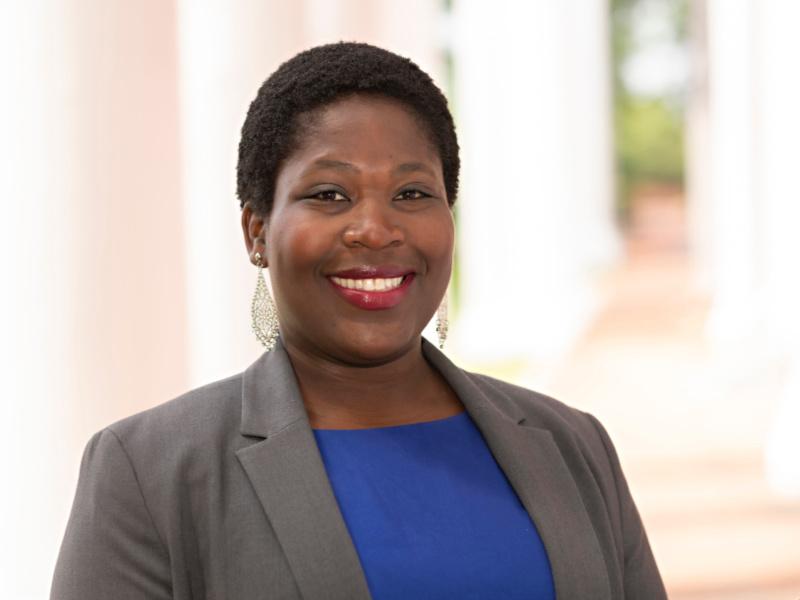CLE Workshop: "Family Legal Fiction"
Carla Laroche
Felder-Fayard Associate Professor of Law, Tulane Law School
More Information
The Murphy Institute's Center on Law and the Economy hosts workshops each semester featuring both Tulane and guest faculty in law, economics, and political science who present their latest research in regulation, civil rights, the criminal legal system, and other key issues in law and the economy. Hosted by Adam Feibelman, Director of the Center on Law and the Economy and Sumter D. Marks Professor of Law at Tulane Law School, CLE workshops are open to faculty, students, and the Tulane community.
Carla Laroche (she/her) is the Felder-Fayard Associate Professor of Law at Tulane University School of Law and The Murphy Institute. She has dedicated her career to increasing access to justice and opportunities for systemically excluded communities. Her scholarship addresses barriers to access to justice, with a focus on criminal law, gender, race, civil rights, and family law.
Laroche’s research analyzes how people navigate civil legal systems and seek to access their civil rights when they have criminal arrest and conviction histories. Her work is published in traditional law journals, including Boston University Law Review and Columbia Journal of Race and Law, bar journals, and newspapers. Laroche has presented these pressing issues at workshops, conferences, and community events and has been interviewed for print and other media outlets around the nation and internationally. Prior to joining Tulane, Laroche was an Associate Clinical Professor at Washington & Lee University School of Law (W&L). She founded and directed the Civil Rights and Racial Justice Clinic at W&L, which focused on the economic rights of communities through direct representation, community engagement, and systemic reform measures. Laroche was a clinical professor at Florida State University College of Law, where she founded and directed the Gender and Family Justice Clinic and taught Gender Justice, an interview skills course that analyzed the factors that push women and girls into the criminal legal system, and COVID-19 and the Law, an upper-level writing seminar. In recognition of her teaching skills, she was selected as the sole inaugural recipient of the FSU 2020-21 Community Engaged Teaching (Graduate) Award. The Collateral Consequences Project she developed achieved an Honorable Mention for Excellence in a Public Interest Case or Project from the Clinical Legal Education Association for its work on restoring the right to vote for people with convictions in Florida. Previously, Laroche served as a criminal justice reform law fellow at the Southern Poverty Law Center, a pro bono fellow at Hunton Andrews Kurth LLP, a federal law clerk in the Southern District of Florida, and a Global Banking and Payments associate at Paul Hastings LLP.
A daughter of Haitian immigrants, Laroche earned, concurrently, her J.D. from Columbia Law School and Master’s in Public Policy, with an international and global affairs concentration, from Harvard Kennedy School, and an A.B. in History, with a certificate in Women and Gender Studies, from Princeton University. Laroche received the National Bar Association’s 40 Under 40, the Excellence in Activism, and the Young Lawyers Division’s Humanitarian Awards. She was also named an American Bar Association On the Rise – Top 40 Young Lawyer. She co-chairs the ABA Criminal Justice Section Women in Criminal Justice Task Force and is a board member of the ABA Center for Human Rights. She serves on the Executive Committee of the Association of American Law Schools’ Criminal Law Section and has also served as a board member and/or volunteer for national and local organizations, including Columbia Law School’s Alumni of Color Council and Public Interest/Public Service Council, Ms. JD, Big Bend A.F.T.E.R. Reentry Coalition, and ABA Commission on Youth at Risk.
ABSTRACT:
For parents sentenced to incarceration in more than half the states in the United States, their incarceration may be grounds for the termination of their parental rights. The criminal legal system punishment may trigger the family regulation system to cut off their legal status as parents. Using these parents’ own words and arguments in court testimony and appellate cases, this Article expands prior legal scholarship by analyzing how parents who are incarcerated define their parenting; it explains the measures parents take to continue to function as parents while separated from their children. The Article then evaluates the way that the family regulation system’s and the criminal legal system’s laws and policies devalue this parenting. Comparing parental actions with legal reality shows that using incarceration as a ground for termination of parents’ parental rights legitimizes the family legal fiction that parents who are incarcerated are not parents. At the intersection of the criminal legal system and the family legal system and with a court order, judges reject parents’ constitutional right to parent their children. In doing so, the family legal fiction desensitizes society to the destruction of families, like during chattel slavery. This Article proposes normative and legal interventions that recognize parental strengths and reduces, if not eliminates, the finality of the family legal fiction for parents who are incarcerated.

